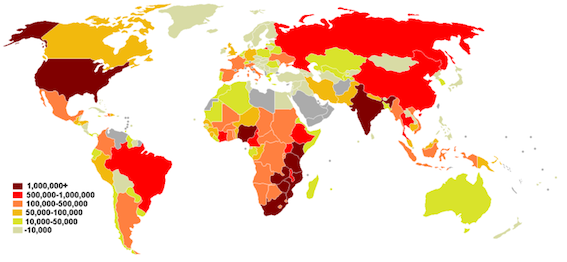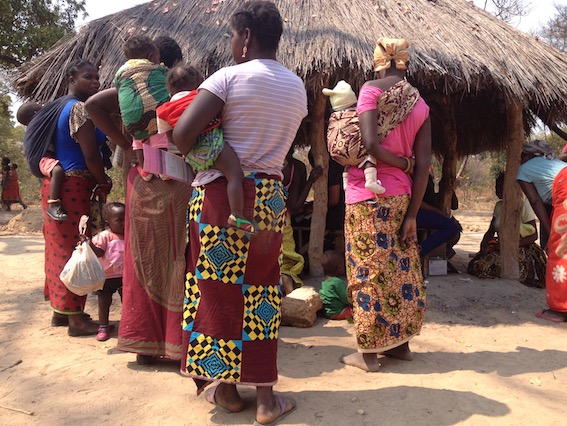The vision
”To promote healing through our lord Jesus Christ in the provision of healthcare for all”
  |
 |
The mission hospital is situated on the mission compound, in central Mpongwe. Patients in great numbers were treated by the mission workers already in the 1940’s. In 1950 permanent wards for men, women and children were built. In 1978 the new hospital was built with funding from SIDA.
Just to give an idea of what the hospital has to offer its patients, here’s a list of the current departments:
|
|
The significance of this hospital is difficult to exaggerate. It serves people in a big and rural area, even patients from outside Mpongwe district come here. It is common that you find long lines of patients waiting for treatment, advice or drugs outside the entrance. Every week outreaches are arranged to provide help for patients that cannot travel to the hospital themselves. If you are interested in viewing some statistics from the hospital, see below for contact information.
Listed below are some of the greatest challenges for the hospital.
MalariaMalaria is a life-threatening disease caused by parasites that are transmitted to people through the bites of infected female Anopheles mosquitoes. It is preventable and curable.
|
 Source: https://commons.wikimedia.org/wiki/File:
Anopheles_minimus.jpg, dec-17 Source: https://commons.wikimedia.org/wiki/File:
Anopheles_minimus.jpg, dec-17
|
HIV/AIDSThe Human Immunodeficiency Virus (HIV) targets the immune system and weakens people’s defence systems against infections and some types of cancer. As the virus destroys and impairs the function of immune cells, infected individuals gradually become immunodeficient. Immune function is typically measured by CD4 cell count. Immunodeficiency results in increased susceptibility to a wide range of infections, cancers and other diseases that people with healthy immune systems can fight off. The most advanced stage of HIV infection is Acquired Immunodeficiency Syndrome (AIDS), which can take from 2 to 15 years to develop depending on the individual. AIDS is defined by the development of certain cancers, infections, or other severe clinical manifestations. Source: http://www.who.int/mediacentre/factsheets/fs360/en/, dec 2017 |
|
TuberculosisTuberculosis (TB) is caused by bacteria (Mycobacterium tuberculosis) that most often affect the lungs. Tuberculosis is curable and preventable. TB is spread from person to person through the air. When people with lung TB cough, sneeze or spit, they propel the TB germs into the air. A person needs to inhale only a few of these germs to become infected. People infected with TB bacteria have a 5–15% lifetime risk of falling ill with TB. However, persons with compromised immune systems, such as people living with HIV, malnutrition or diabetes, or people who use tobacco, have a much higher risk of falling ill. Source: http://www.who.int/mediacentre/factsheets/fs104/en/, dec 2017 |
|
MalnutritionA main cause of malnutrition is poverty, but proper education can make a big difference too. For example, did you know that a child suffering from malnutrition may actually swell up and cause the parents to think there’s no need to become alarmed? Our hospital feeds, educates, treats and goes on weekly outreaches to combat malnutrition. |
|
Mother and Child health
From Monday to Friday every week there are different activities at the Mother and Child Health clinic (MCH). The MCH provides under-five clinic where children up to the age of five get vaccinations and are weighed to have their growth evaluated. There’s also family planning, antenatal clinic and education in different subjects. Every Tuesday a team from the MCH goes on outreach in the rural areas. At the outreach the team provides the same activities as they do at the MCH clinic as well as HIV-testing and counseling. |
|
Family planningFamily planning is offered every week at the MCH and during outreach. Apart from educating and handing out free condomes to both men and women, women are also offered contraceptive injections and tablets. |
|
Spiritual needSpiritual needs and the physical situation are often related. One example is that suicides are quite common in this area, usually from posion taken at a moment of desperation.
To make a difference in a spiritual sense, there are open morning devotions and a hospital chaplain there to serve the patients. |
|
Lack of fundsZambia is ranked as one of the poorest countries in the world. If MMH is to provide healthcare for all in need, we cannot expect the patients to pay for it. All care, medication, food etc. is offered the patiens for free.
The hospital is maintained by donations from a number of vital partnerships that you can read more about below. However, because of lack of funds, it’s a constant struggle to keep the hospital equipped to face the needs. |
|
Need of renovationsMany parts of the hospital haven’t been renovated since its construction in the 1970’s.
Beside making the environment less pleasant for both patients and staff, it can easily become a sanitary issue.
Efforts are being done to make a change (read more about it below!) but there’s still much that could be done. |
 |
Who keeps this hospital running?
Except for the hospital staff who work daily to combat the above challenges, there are a number of donors who make the work possible.
Zambian government
The Zambian government stands for a big portion as they pay the salaries to all the professional medical staff.
Interact
Donations from Interact (EFK) contribute to the salaries for administration and maintenance staff.
The mission farm
Since MBA owns a farm in Mpongwe that is currently leased to a contractor. A portion of the income goes directly to the hospital.
CHAZ
Churches Health Association of Zambia lobby for money from international organisations and the government, which provides recourses for programmes to combat HIV/AIDS and TB.
Zambeef
This company deserves acknowledgement as they donate chicken, maize and cocking oil to the hospital kitchen, who can provide food to the patients, free of charge.
People like you!
There are both groups and individuals from Europe that contribute greatly to our hospital. Just to give a few examples, there’s a group of medical students from Galway University in Ireland, and also another group from the UK that have helped renovating/building different parts of the hospital. The UK-group tiled the floors to of the wards and the Galway students constructed the Out-patients department.
Individuals like the farmer Anders Ivarsson from Sweden have ment a great deal for the mission farm and for the building of accommodation for hospital workers. Another example is the doctor Gunnar Holmgren who have worked many years at the hospital and brought both volunteers, visitors and attention to our hospital.
If you read about our hospital and can think of something you could help with, please don’t hesitate to contact us. Maybe you can help bring attention from churches or humanitarian organisations? Can you bring together a group that could make a difference? Would you consider donating money for our cause or are you perhaps a medical student or professional who want to work with us on site? If you have an idea, get in touch!
 |
|
Mr Chisenkebele
Hospital Manager
mpongwemissionhospital@gmail.com
+26 0967 590659 +26 0955 496991 |





